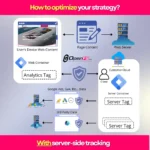Understanding Artificial Intelligence SEO in Today’s Digital Landscape
I’ve been in the SEO game for years, and let me tell you, the changes we’re seeing with artificial intelligence SEO are unlike anything I’ve witnessed before. Remember when we used to obsess over keyword density and meta tags? Those days feel like ancient history now. The integration of AI into search has fundamentally transformed how we need to approach optimization, and if you’re still playing by the old rules, you’re essentially bringing a knife to a gunfight.
What’s really fascinating is how artificial intelligence has shifted the entire paradigm of search. We’re no longer just optimizing for algorithms that count keywords and links. Instead, we’re dealing with sophisticated AI systems that actually understand context, intent, and even the subtle nuances of human language. This isn’t just an evolution; it’s a complete revolution in how search engines process and deliver information.
The Disruption of Traditional SEO by Artificial Intelligence
Let’s get real for a moment. Traditional SEO tactics that worked just a few years ago are becoming increasingly obsolete. I recently worked with a client who was still focused on exact-match keywords and building directory links. Their traffic had plummeted by 60% over six months, and they couldn’t figure out why. The answer? They were optimizing for a search landscape that no longer exists.
Artificial intelligence SEO represents a fundamental shift in how search engines understand and rank content. Google’s AI systems, including RankBrain and BERT, don’t just match keywords anymore. They comprehend the meaning behind queries, understand context, and can even infer what users really want, even when they don’t express it clearly. This level of sophistication means that old-school tactics like keyword stuffing or creating thin content pages for every keyword variation are not just ineffective – they’re actually harmful to your rankings.
Key Transformations in the Artificial Intelligence SEO Era
The changes we’re experiencing go far beyond simple algorithm updates. Here’s what’s really happening:
- Natural Language Processing (NLP) dominance: Search engines now understand conversational queries, making long-tail keywords and question-based content more valuable than ever
- Semantic search capabilities: AI can connect related concepts without explicit keyword matches, rewarding comprehensive, topic-focused content
- User intent prediction: Machine learning algorithms analyze user behavior patterns to predict what searchers really want
- Multi-modal understanding: AI can process text, images, voice, and video together to provide more relevant results
- Real-time personalization: Search results are increasingly tailored to individual users based on their search history and preferences
How AI is Revolutionizing Search Behavior and User Expectations
The way people search has changed dramatically, and it’s all thanks to AI. I was talking to my neighbor the other day, and she mentioned how she asks her phone complete questions now, like “What’s the best Italian restaurant near me that’s open late and has vegan options?” That’s a far cry from typing “Italian restaurant near me” into Google.
This shift in search behavior is forcing us to completely rethink our SEO strategies. Users expect immediate, accurate, and conversational responses. They’re not interested in clicking through multiple pages to find what they need. They want answers, and they want them now.
The Multi-Platform Search Revolution
Here’s something that might surprise you: Google isn’t the only game in town anymore. While it’s still dominant, users are increasingly turning to alternative platforms for their search needs:
- ChatGPT and AI chatbots: Millions of users now start their searches with conversational AI instead of traditional search engines
- Voice assistants: Alexa, Siri, and Google Assistant handle billions of queries daily, often without users ever seeing a traditional SERP
- Social media search: TikTok and Instagram have become primary search engines for Gen Z, especially for product discovery and recommendations
- Specialized AI tools: Perplexity, You.com, and other AI-powered search engines are gaining traction among tech-savvy users
- Visual search platforms: Google Lens and Pinterest Lens are changing how we search for products and information
Implementing Effective Artificial Intelligence SEO Strategies
So, how do we adapt to this new reality? The good news is that AI actually rewards what we should have been doing all along: creating genuinely helpful, well-structured content that serves user needs. But there are specific strategies that work particularly well in the age of artificial intelligence SEO.
First and foremost, you need to understand that AI systems are looking for expertise, authority, and trustworthiness (E-A-T) more than ever. They can identify shallow content from a mile away. I’ve seen websites that used to rank well with 500-word blog posts now struggling to get any visibility because their content lacks depth and real value.
Optimizing Content for AI Comprehension
Creating content that AI can understand and value requires a strategic approach. Here’s what’s working for my clients right now:
- Answer-first content structure: Lead with clear, concise answers to user questions, then provide supporting details
- Comprehensive topic coverage: Instead of multiple thin pages, create authoritative guides that cover topics thoroughly
- Natural language optimization: Write how people speak, using conversational phrases and question formats
- Structured data implementation: Help AI understand your content better with proper structured data markup
- Entity optimization: Build topical authority by consistently covering related entities and concepts
Building Authority Signals for AI Algorithms
AI systems are incredibly sophisticated at evaluating credibility. They look at signals far beyond traditional backlinks:
- Consistent NAP information: Ensure your business name, address, and phone number are identical across all platforms
- Expert author profiles: Showcase the credentials and expertise of your content creators
- Quality over quantity in backlinks: Focus on earning links from authoritative, relevant sources rather than chasing numbers
- User engagement metrics: AI pays attention to how users interact with your content – time on page, bounce rate, and return visits matter
- Social proof and reviews: Authentic reviews and testimonials signal trustworthiness to AI systems
Advanced Artificial Intelligence SEO Techniques for 2025
Let’s dive into some advanced strategies that are making a real difference. These aren’t your typical SEO tips – they’re specifically designed to work with AI-powered search systems.
One technique that’s been incredibly effective is what I call “conversation mapping.” Instead of traditional keyword research, we map out entire conversations around topics. For example, if you’re writing about AI-powered SEO strategies, you’d map out all the questions someone might ask in a conversation about that topic, then structure your content to address those questions naturally.
Leveraging AI Tools for Better Optimization
Here’s where it gets interesting – we can use AI to optimize for AI. The best AI SEO tools available today can help you:
- Analyze search intent at scale: Understanding what users really want when they search
- Generate content outlines: Creating comprehensive structures that cover topics thoroughly
- Optimize for featured snippets: Formatting content to win those coveted position zero spots
- Track AI-specific metrics: Monitoring performance across different AI-powered platforms
- Predict content gaps: Identifying what your competitors are missing and filling those gaps
Measuring Success in the Age of Artificial Intelligence SEO
Traditional metrics like keyword rankings are becoming less relevant. Sure, they still matter, but they don’t tell the whole story anymore. With ChatGPT SEO and other AI platforms changing how people search, we need to track different metrics:
- AI platform visibility: Are you appearing in ChatGPT responses, Google’s AI overviews, or Bing Chat results?
- Brand mention frequency: How often does AI recommend your brand or cite your content?
- Topic authority scores: Tools like Clearscope and MarketMuse can measure your topical authority
- User engagement depth: Are visitors consuming multiple pieces of content and returning to your site?
- Cross-platform performance: Track visibility across Google, Bing, social media, and AI chatbots
Critical Mistakes in Artificial Intelligence SEO Implementation
I’ve seen plenty of businesses stumble when trying to adapt to AI-driven search. The biggest mistake? Thinking they can game the system with shortcuts. AI is too smart for that now. Here are the pitfalls I see most often:
- Over-relying on AI-generated content: While AI can help with content creation, publishing unedited AI content is a recipe for disaster
- Ignoring user experience: AI heavily weighs user satisfaction signals – if your site is slow or hard to navigate, you’re toast
- Neglecting mobile optimization: With voice search growing, mobile experience is more crucial than ever
- Focusing solely on Google: Diversify your presence across multiple AI-powered platforms
- Forgetting about local SEO: AI often prioritizes local results, especially for service-based queries
The Future Landscape of Artificial Intelligence SEO
Looking ahead, the integration of AI in search is only going to deepen. We’re already seeing glimpses of what’s coming, and it’s both exciting and challenging. SEO in 2025 will look vastly different from what we’re doing today.
One trend I’m particularly excited about is the rise of multimodal search. Imagine taking a photo of a broken appliance and getting instant repair instructions, or humming a tune and finding the song along with similar music recommendations. This isn’t science fiction – it’s happening now, and it’s changing how we need to think about optimization.
Preparing Your Strategy for Next-Generation Search
To stay competitive in this evolving landscape, you need to start preparing now. Here’s what I’m advising my clients to focus on:
- Build genuine expertise: AI can spot fake expertise easily – invest in becoming a true authority in your niche
- Create multimedia content: Diversify beyond text to include video, audio, and interactive elements
- Foster community engagement: User-generated content and community discussions signal relevance to AI
- Implement advanced schema markup: Help AI understand the relationships between different pieces of content
- Maintain technical excellence: Site speed, security, and mobile responsiveness remain crucial ranking factors
Taking Strategic Action with Artificial Intelligence SEO
Now comes the important part – actually implementing these strategies. I always tell my clients that knowledge without action is worthless. You need a systematic approach to transitioning from traditional SEO to artificial intelligence SEO.
Start by conducting a comprehensive audit of your current SEO efforts. Look at your content through the lens of AI – does it answer questions comprehensively? Is it structured in a way that AI can easily parse and understand? Are you providing genuine value, or are you still trying to game the system with outdated tactics?
Next, identify the low-hanging fruit. Maybe you have great content that just needs better structure. Perhaps your on-page SEO is solid, but you’re missing opportunities in voice search optimization. Focus on areas where small changes can yield significant results.
Building Your AI-Optimized Content Strategy
Creating content for the AI era requires a different mindset. Instead of thinking about keywords, think about topics and user needs. Here’s a practical framework I use:
- Topic research: Identify core topics relevant to your audience and business goals
- Intent mapping: Understand the different intents behind searches related to your topics
- Content planning: Create comprehensive pieces that address multiple related queries
- Format optimization: Structure content for both human readers and AI comprehension
- Performance monitoring: Track how your content performs across different AI-powered platforms
- Continuous improvement: Use insights to refine and expand your content strategy
Real-World Success with Artificial Intelligence SEO
Let me share a quick success story. A local New Jersey business I work with was struggling to compete with larger competitors. We completely revamped their approach, focusing on local SEO optimization with an AI-first mindset. Within six months, they were appearing in voice search results, Google’s AI overviews, and even getting recommended by ChatGPT for local queries. Their organic traffic increased by 150%, but more importantly, their conversion rate doubled because the traffic was highly qualified.
The key to their success? They stopped trying to rank for every possible keyword and instead focused on becoming the most authoritative, helpful resource in their specific niche. They answered real questions from real customers, used natural language, and built genuine relationships with their audience.
Conclusion: Embracing the AI Revolution in SEO
The transition to artificial intelligence SEO isn’t optional – it’s essential for survival in today’s digital landscape. But here’s the thing: it’s actually making SEO better. We’re moving away from tricks and hacks toward creating genuinely valuable content that helps real people solve real problems.
If you’re feeling overwhelmed by these changes, you’re not alone. Many businesses are struggling to adapt. But with the right approach and a willingness to evolve, you can not only survive but thrive in this new era. Remember, AI rewards authenticity, expertise, and user value – focus on these elements, and you’ll be well-positioned for success.
The future of search is here, powered by artificial intelligence, and it’s more exciting than ever. By understanding how AI works, adapting your strategies accordingly, and maintaining a focus on genuine value creation, you can achieve remarkable results. Don’t wait for your competitors to figure this out first – start implementing these artificial intelligence SEO strategies today and position your business for long-term success.
Frequently Asked Questions
How is artificial intelligence SEO different from traditional SEO practices?
Artificial intelligence SEO focuses on understanding user intent and natural language rather than just matching keywords. While traditional SEO relied heavily on keyword density and exact-match phrases, AI-driven search engines comprehend context, semantics, and conversational queries. This means creating comprehensive, topic-focused content that answers real questions instead of trying to rank for specific keyword variations.
Can I still use my existing SEO strategies alongside artificial intelligence SEO techniques?
Absolutely! Many fundamental SEO principles still apply, like creating quality content, earning authoritative backlinks, and ensuring excellent user experience. The key is to enhance these traditional strategies with AI-focused elements such as natural language optimization, structured data implementation, and multi-platform visibility. Think of it as evolution rather than replacement – your existing strategies need to be adapted, not abandoned.
What tools should I use to optimize for artificial intelligence SEO?
Start with tools that help you understand search intent and content optimization, such as Clearscope, MarketMuse, or Surfer SEO. For technical implementation, use Google’s Structured Data Testing Tool and Schema.org markup generators. Additionally, monitor your performance across AI platforms using tools like Semrush’s AI Overview tracker and ChatGPT plugins that show citation sources. The key is choosing tools that help you create comprehensive, well-structured content rather than just targeting keywords.
How long does it take to see results from artificial intelligence SEO efforts?
Results from AI-focused SEO typically appear faster than traditional SEO, especially for voice search and featured snippets. You might see improvements in 2-3 months for well-optimized content, compared to the 6-12 months often required for traditional keyword rankings. However, building true topical authority and consistent AI platform visibility is a longer-term investment that compounds over time. Focus on consistent implementation rather than quick wins for sustainable success.
 Written by: Romulo Vargas Betancourt
Written by: Romulo Vargas Betancourt
CEO – OpenFS LLC







